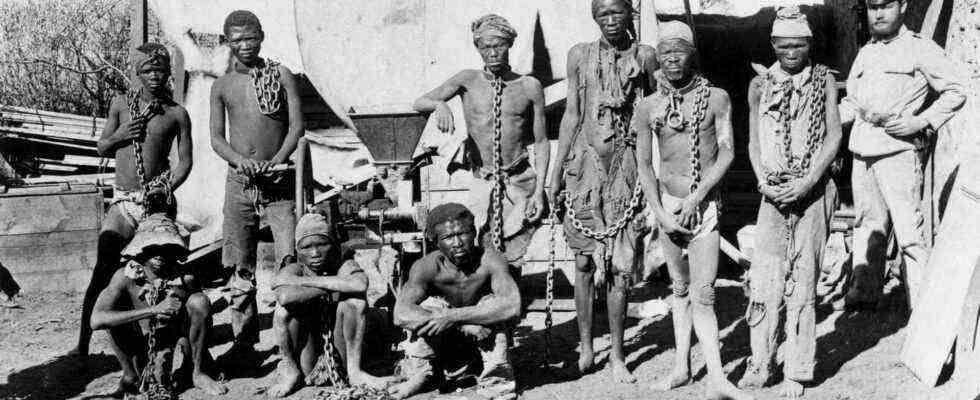As of: 01/26/2022 5:05 p.m
At the beginning of the 20th century, German colonial troops committed genocide against the Herero and Nama. Germany recognized this in an agreement with Namibia. Descendants of the victims criticize that they were not involved in the talks.
Representatives of the Herero and Nama ethnic groups from Namibia have called on the federal government to reject a reconciliation agreement on colonial history negotiated with the Namibian government. “We will never accept this agreement until we become part (of the negotiation process),” Berlin Herero activist Israel Kaunatjike said at an online press conference. He called for new negotiations on reparations for German colonial crimes at the beginning of the 20th century.
It is about the “recognition of the genocide” by German colonial troops in what was then German South-West Africa and about the close involvement of the affected communities in the negotiations, said Kaunatjike.
“There must be a restart of the negotiations”
Mutjinde Katjiua from the Namibian Herero association Ovaherero Traditional Authority (OTA) described the German-Namibian agreement negotiated last year as a “flop”. “Negotiations have to be restarted,” he said, demanding direct reparations payments to the descendants of the victims.
The descendants of Herero and Nama emphasize that the genocide still affects the existence of the communities today. For example, 70 percent of Namibia’s arable land is in the hands of white settlers, many of them of German descent. Many Herero and Nama, on the other hand, are still destitute and live on reservations.
Confederation does not want to “fall behind what has been achieved”
A spokesman for the Foreign Office said the decision on the German offer was primarily the responsibility of the Namibian government. The proposal was “developed jointly with Namibia”. Five representatives of the descendants of the victims were involved in “all rounds of negotiations”. “We, as the federal government, also made sure from the start that representatives of the Nama and Herero were involved in all phases,” said a spokesman from Berlin.
Under no circumstances will the new government fall behind what has been achieved so far, the spokesman said. The Federal Government acknowledges with respect that there is still a need for discussion in Namibia. In addition, the “joint declaration” should not be the end of the understanding, but the beginning of an intensive exchange.
In May of last year, the then federal government and the Namibian government announced that they had reached an agreement on a reconciliation agreement, which provides for reconstruction aid totaling 1.1 billion euros in compensation for German colonial crimes in what is now Namibia.
In the agreement, the German colonial crimes against the Herero and Nama are recognized as “genocide” in the historical sense, but not in the sense of international law. The legal term “reparations” is therefore not used.
Criticism of the German-Namibian agreement
The German-Namibian agreement was heavily criticized by the opposition in Namibia and representatives of the Herero and Nama, among others. They complain that victims’ representatives are not involved in the negotiations with Germany and insist on official recognition of the genocide, also in the sense of international law. The Namibian parliament has not yet ratified the reconciliation agreement.
Herero activist Kaunatjike and Nama activist Sima Luipert started a petition to Federal Foreign Minister Annalena Baerbock on the Change.org platform. In it, they criticize Germany’s handling of its colonial history as completely inadequate.
“Germany prides itself on its self-critical culture of remembrance, especially when it comes to commemorating the Holocaust. Despite many confessions, German colonialism is too often swept under the carpet,” write Kaunatjike and Luipert. “The destruction of our communities intended by Germany was a preliminary stage on the way to the Holocaust.”
A memorial in the center of the Namibian capital commemorates the genocide of the Herero and Nama committed by German colonial troops from 1904 to 1907.
Image: dpa
More than 80,000 dead
Today’s Namibia was a German colony from 1884 to 1915 in what was then German South West Africa. Between 1904 and 1908, German colonial troops brutally suppressed uprisings by the Ovaherero, in German usage mostly in the singular Herero, and Nama. More than 80,000 people were killed or died of thirst in the desert.
The coalition agreement between the SPD, Greens and FDP states: “Reconciliation with Namibia remains an indispensable task for us, which arises from our historical and moral responsibility. The reconciliation agreement with Namibia can be the start of a joint process of coming to terms with the past.”

